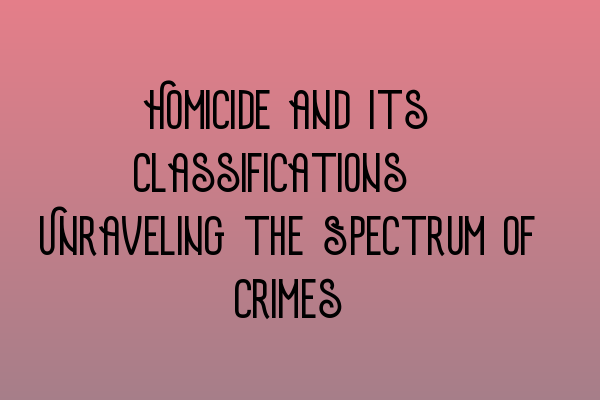Homicide and Its Classifications: Unraveling the Spectrum of Crimes
Welcome to SQE Criminal Law & Practice Law UK, where we provide comprehensive insights into various legal topics. In this blog post, we will delve into the intricate world of homicide and explore its classifications. Understanding the different types of homicides is crucial for both legal professionals and individuals seeking knowledge about criminal law.
Defining Homicide
Before we delve into the classifications, let’s begin by defining homicide. In simple terms, homicide refers to the act of causing the death of another person. It encompasses a wide range of scenarios, from intentional killings to accidental deaths. Homicide is typically regarded as one of the most serious offenses within the legal system.
Classification of Homicide
Now let’s unravel the spectrum of crimes within the domain of homicide. We can broadly categorize homicides into three main classifications:
- Murder: Murder is the most severe form of homicide and involves the intentional killing of another person. It is premeditated and executed with malice aforethought. Murder can be charged as first-degree or second-degree, depending on the jurisdiction and specific circumstances of the case. To gain more knowledge about murder charges, you can read our related article on SQE 1 Practice Mocks FLK1 FLK2.
- Manslaughter: Manslaughter refers to the unlawful killing of an individual without prior intent to cause death. Unlike murder, manslaughter involves varying degrees of negligence or provocation. It can be classified into voluntary manslaughter, which occurs in the heat of the moment, and involuntary manslaughter, which results from a reckless act. If you want to test your understanding of manslaughter, check out our SQE 1 Practice Exam Questions article.
- Infanticide: Infanticide is a unique classification of homicide that specifically pertains to the intentional killing of an infant by its mother. This offense is often influenced by the mental state and postpartum depression of the mother. Infanticide is considered a distinct crime due to its specific circumstances and societal implications. To know more about infanticide, consider our comprehensive SQE 2 Preparation Courses.
Conclusion
Homicide, with its various classifications, is a complex area of criminal law. Understanding these distinctions is crucial for legal professionals and individuals interested in the subject. In this blog post, we have explored murder, manslaughter, and infanticide, shedding light on their unique characteristics. If you want to stay updated on legal topics and upcoming SRA SQE exam dates, check out our SRA SQE Exam Dates page. For more in-depth preparation on SQE 1, our SQE 1 Preparation Courses will be of great help.
Thank you for reading our blog post! Stay tuned for more informative content on criminal law and related legal topics.
